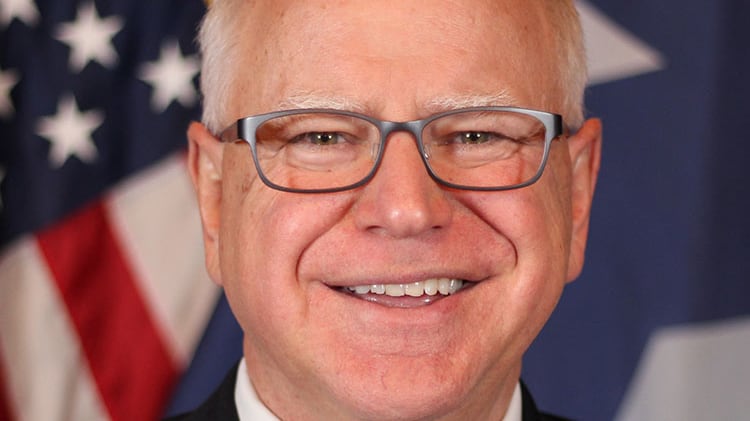A Portland-based eyewear company designed the glasses Minnesota Gov. Tim Walz wears most often (if his dog doesn’t eat them again). Vice President Kamala Harris’ running mate on the Democratic Party’s 2024 presidential ticket wears 141 Eyewear’s frame Stark, in the color Slate Copper. A 141 Eyewear rep tells WW the Slate frame’s average retail price is $267, which is on the more affordable end for independently designed eyewear.
According to the company’s rep, Gov. Walz purchased the glasses from one of 141 Eyewear’s Minnesota clients, suggesting that he consulted with an independent optician instead of shopping online himself (Gov. Walz’s office did not respond to WW’s interview requests).
141 Eyewear is an independent optical designer founded in 2009. The company is notable for its ongoing charitable initiative, pledging to donate a pair of its classically shaped and colored frames for each one purchased through its authorized retailers; like many indie glasses designers, 141 Eyewear doesn’t have an online store. Donated frames are distributed to well-regarded optometric charity organizations, including the Lion’s Club and Remote Area Medical, according to 141 Eyewear’s website.
But like fellow feel-good, ‘00s-founded designer Tom’s Shoes—which abandoned its own one-for-one donation model in 2021—141 Eyewear hasn’t operated without controversy. 141 Eyewear founders Kyle and Shu-Chu Yamaguchi settled under undisclosed terms in a civil suit for their involvement in a reseller ring of stolen, highly coveted collectible Nike shoes, as reported by The Oregonian in 2014. Kyle Yamaguchi, who also founded the sunglasses line Look/See, was sentenced to probation and community service in a related criminal case.
Heather Branderhorst, president of the nonprofit educational organization Opticians Association of Oregon, commended Gov. Walz for working with an independent optician to pick out his glasses instead of shopping online or at a big box chain. Branderhorst says shopping with inexperienced opticians, or without one at all when shopping online, can lead to purchasing glasses that don’t fulfill a patient’s needs if the lab where the glasses’ lenses are made uses inferior materials and lower quality assurance standards than independent opticians typically use. There may also be a larger margin of error if measurements for a patient’s prescription and facial features aren’t taken into account.
“How a frame fits on a patient’s face is as important as how the lenses are made,” she says. “When working with an optician, [Gov. Walz] is able to actually have somebody fit the glasses on his face, take the appropriate measurements needed for the lenses to be manufactured for his individual needs, and the quality of lenses and frame that he is getting are going to be so much better than online.”
Branderhorst believes talking about Gov. Walz’s glasses makes for more than just a trivial fashion story.
“Anytime that we have opticianry being discussed nationally, citywide, statewide, whatever, there’s a lot of opportunity for education,” she says, “and that’s exactly what we do, is we educate our patients so they can make educated decisions on their eyewear.”
